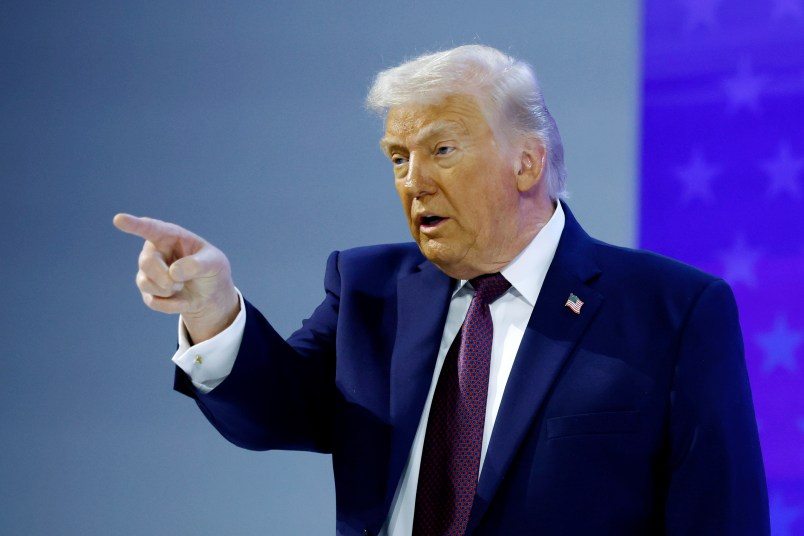
For more than a day between Monday night and Tuesday evening this week, Sen. Cory Booker (D-NJ) captured the country’s attention with an extraordinary speech protesting President Trump. Booker’s 25 hours-plus remarks on the Senate floor broke a more than 60-year-old record while earning hundreds of thousands of views and hundreds of millions of likes on social media. In the aftermath of the speech, Booker talked to TPM about his strategy, how it felt to see the Senate return to regular business, and how he hopes to inspire the public to join him in protest.
“I’ve seen, time and time again, Trump do things and then reverse himself because some force stops him. He’s a guy that is going to trample over any kind of separation of powers, trample over norms, trample over bounds of decency. I could go through all the things that this guy is going to do if we let him — if we let him,” Booker told TPM in a phone conversation on Wednesday night.
“So my thing is, the more organized people are, the more activated people are, the more engaged people are, the more they exercise the greatest power you have in a democracy, which is your voice, the more creative in their protests they are to awaken the conscience of others, that’s how we win this,” he added.
Senate rules required Booker to stay on his feet the entire time in order to hold the floor. He was not able to take bathroom breaks and, apart from brief moments where colleagues were able to support him by asking questions, Booker, who was aiming to break the previous record for the Senate’s longest speech — held by the late South Carolina segregationist Strom Thurmond (R-SC) — had to speak continuously. On Tuesday afternoon, somewhere around hour twenty, Booker’s heart was racing and he experienced intense cramps.
“I think I hit a wall, physically,” Booker recounted.
However, he had no doubt about continuing, he said. Part of that strength came from colleagues who showed up to watch and cheer as he approached the finish line. And, according to Booker, something else came through for him as well.
“The body has its limitations, but the spirit doesn’t. And there’s a lot of people that … hit a wall physically that find somehow, you know, to push past that because you’re riding the spirit,” Booker said. “In the last five hours, I mean, you’re standing in that chamber and it’s full and you see your staff and you see it in their eyes. …The energy in that space that I was in. … I was just being carried by the spirit.”
Some news outlets — including TPM — measured Booker’s remarks as lasting 25 hours and five minutes. Others counted 25 hours and four minutes. Booker told TPM he wasn’t sure which number was right: He started a timer on his phone the moment he took the floor, but he forgot to stop the clock when he left and was embraced by colleagues, staff, and supporters. One thing Booker knew for sure was that he wanted to beat Thurmond’s 24-hour-and-18-minute speech, which was an explicitly racist filibuster of the Civil Rights Act of 1957. After he broke Thurmond’s record, Booker told reporters he had viewed it as a “shadow” that was hanging over the Senate. And, when he approached the record mark, Booker said he made up his mind to push further.
“I said, ‘I’m not going to stop at the record. I’m going to go to 25 hours,’” Booker said.
Whether it was four minutes beyond that or five, Booker said he’s “grateful” for the “little change” he added to his 25 hours.
Booker’s remarks included a mix of religious fervor, quotes from past leaders, and, particularly, references to Civil Rights icons, especially the late activist and congressman John Lewis, who is one of his major influences. He peppered these bits of hope throughout his extensive, detailed case, which focused on the abuses and dangers perpetuated by Trump’s second administration in the two months and change since he took office. Booker’s staff said the planning for the speech included preparing over a dozen binders with over a thousand pages of material. There was a distinct emphasis on letters from constituents personally affected by Trump’s wave of deportations and his aggressive cuts to federal jobs and programs. Booker also included analysis from conservative economists and legal minds to underscore the idea that opposing Trump should not be a partisan concern.
As a former college football player who has remained focused on his health and fitness, Booker’s preparation also included a physical component.
“If I had to advise somebody … I might tell them to do it differently. My strategy was to get my body into ketosis by fasting. So I started fasting on Friday … I knew from doing intermittent fasting that when I’m in ketosis I get wicked energy and clarity of thought,” Booker said. “The one that I wouldn’t advise people to do is that I stopped drinking the day before. I stopped liquids. … That definitely put my body in distress.
Booker wears an Oura ring, which tracks various physical data points. The numbers from the final stretch of his speech were striking.
“I started sweating, my heart rate jumped up. You could see the line from a normal heart rate to suddenly well over a hundred. … And then my body in the end, I was getting the kind of muscle cramps I used to get when I played football where you’re dehydrated,” Booker said. “It worked in the sense that I didn’t have to go to the bathroom, but it definitely put a lot of strain on my body.”
After walking off the floor, Booker quickly had a banana and watermelon.
“I just wanted to flush my body with electrolytes and fruit,” he said.
However, there was something else on the menu. Within minutes of Booker yielding the floor, Republicans brought forward a vote on Matthew Whitaker, a former DOJ official during the first Trump administration who is the president’s pick to be ambassador to NATO. Democrats agreed to unanimous consent, which allowed the Whitaker vote to proceed more quickly without debate and other procedural delays. There was a clear whiplash effect in watching Democratic senators allow a Trump nominee to proceed after Booker expended so much energy with a display that he said was designed to disrupt “business as usual” and show these were not “normal” times. However, Booker said he was not surprised to see Republican Senate Majority Leader John Thune get back to his own schedule.
“I knew that Thune has an agenda. I’m not talking about an ideological agenda, he has things he needs to accomplish on the floor of the Senate,” said Booker. “He was going to find a way and, maybe if I had pushed him into midnight, he would’ve not have done it, but it was 8:00 p.m.”
Nevertheless, Booker was certain he had “accomplished something” and that it went “far beyond” perhaps even Thune’s expectations. Booker did manage to delay the Whitaker vote. Amid his fruit break, he voted against the nomination. However, Whitaker was confirmed and even earned the support of one of Booker’s fellow Democrats, Sen. Jeanne Shaheen (D-NH).
The Whitaker vote touches on frustration that many progressives have had with congressional Democrats since Trump took office in January. Many on the left want the party’s Senate minority to oppose Trump with every tool they have including procedural maneuvers such as withholding unanimous consent. Booker was well aware of the frustration from the public, which, he said, included “venting” from even some of his own staff.

Booker said he agreed with constituents who felt elected Democrats had to “do more” and that this was a major driver of his decision to spend over a day holding up the floor.
“What we were doing was inadequate,” said Booker. “So, thus, I’m doing more. I’m trying something different. I’m going to take a risk. And that really was the impetus for the whole thing. … I think one of the messages I was trying to deliver was, okay, I’m stepping up more. I will. I hear you.”
While Booker clearly believed this was a time for drastic action, he does not agree with the calls to use unanimous consent and other tools to dramatically slow down Senate business.
“That’s something that my colleagues and I discuss around, and round, and round: What are the tactics available to us? The challenge with taking steps like that is the Senate is the kind of place … when you break it, it never gets fixed,” Booker said.
As an example of this, Booker pointed to the past calls for Democrats to eliminate the filibuster on judicial nominees, which required sixty votes for confirmation rather than a simple majority. Republicans consistently used that rule to block President Obama’s court picks. In 2013, the same year Booker joined the Senate, Democrats were in the majority and their leader, Harry Reid, lifted the filibuster for most presidential nominees in order to sit some of Obama’s judges. Four years later, when the Republicans were in control, they followed suit and ended the filibuster for Supreme Court justices. That move helped Trump cement a conservative majority on the nation’s highest Court that is set to last for a long time.
“You have to really consider in the Senate that, when you do something, it’ll never be fixed. When you ratchet one way, you can never ratchet it back,” Booker said.
Booker suggested grinding the Senate to a halt in the short term might leave it that way “in the long run.” He also questioned whether procedural maneuvering would really have public impact.
“Would really America notice if we were denying unanimous consent?” Booker asked.
Progressives eager for more opposition to Trump have also been frustrated to see Democrats voting to confirm some of the president’s nominees. Booker has voted for four of Trump’s Cabinet picks. This is one area where his thinking has changed watching Trump’s actions in office.
“In the beginning … I had a different spirit. I didn’t know that he would go to that many extremes as he did,” Booker said.
Once Trump ally Elon Musk and his “DOGE” team began going inside federal agencies and seeking what Booker described as “the most private personal information of people,” the senator’s mind changed.
“At that point, my staff and I said, ‘We can’t vote for these people anymore,’” Booker said.
However, Booker said there is an “exception” to this rule. He will make a pragmatic “calculation” and consider supporting a nominee if he believes it is someone his office can have a “relationship” and communication with in the event there’s “an urgency to help” his constituents with a given issue.
“That’s some of the calculus we’re using these days, is — and it still resulted in pretty much cross the board nos, but — we’re still looking at candidates and thinking to ourselves, pros and cons,” Booker said.
Booker said his speech came out of deciding this was a time to “think outside of the box and try something different.” He alluded to the words of James Baldwin as he described the strategy behind going for the 1957 record.
“Will we win for certain? I don’t know, but, as it was said by somebody far or greater than me, nothing that’s not faced can be changed. If you don’t face it, if you don’t try, if you don’t step up, you can’t make the change,” said Booker. “So, I want to be one of those people out there saying, ‘Look at me in the position that I have and hold me to account.’ … I’m a United States senator. … It is on me. I own it. I have to do more. I have to show how much I’m willing to fight.”
While Booker wants to be accountable for his role in standing against Trump, he also wanted his stand on the Senate floor to encourage the public to find their own ways to protest and oppose the president’s agenda. Booker said he’s “asking everybody” to look in the mirror and “ask yourself, ‘Have I done enough?’”
“Your little bit of good, my little bit of good, everybody’s little bit of good coming together can overwhelm anything Donald Trump could try to do to us,” Booker said. “We know who he is. What we’re going to find out, I think, in the coming weeks and months is who we are, what the character of our country is.”




